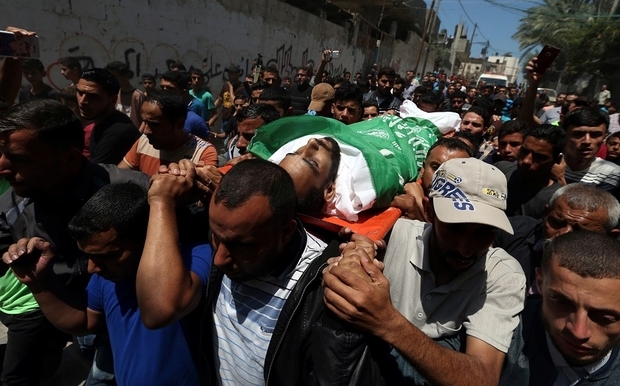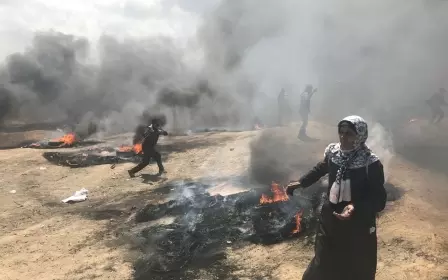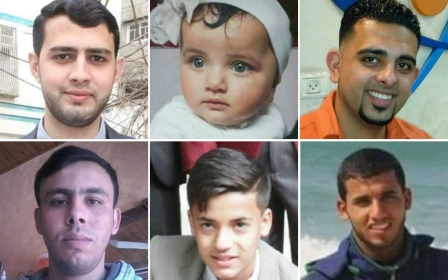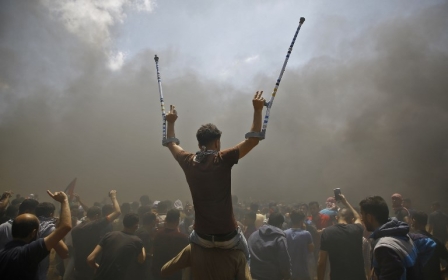Gaza blame game: Israel pours scorn on Hamas after killing 60 people

The killing of scores of Palestinian protesters in Gaza has put Israel's use of snipers and live fire under the spotlight, but its political leaders and military are insisting on a different narrative - one that blames the Hamas movement.
"This is Hamas' plan," the Israeli military said on Twitter on Tuesday, alongside a dramatic video of smoke rising along the perimeter. That post was followed through the day with allegations about Hamas's role.
The Israelis say Hamas organised the protests, paid people to attend, and incited them to break through Israel's security fence along Gaza's perimeter.
Hamas says the protests were popular and peaceful, controlled not by Hamas but certainly encouraged. Monday and Tuesday's protests coincided with Nakba Day and the relocation of the US embassy in Israel to Jerusalem.
In the aftermath, Middle East Eye looks at what both sides have said, and the circumstances surrounding the mass killing of Palestinian civilians by Israel.
Israel: Hamas leader incited Palestinians to kill Israelis
Speaking to the BBC's Radio 4 on Tuesday, Mark Regev claimed Hamas' leader in Gaza, Yahya Sinwar, was promoting violence and incitement.
Regev quoted Sinwar as stating he wanted Palestinians to attack Israelis and "tear out their hearts".
Regev has in his past role as spokesman for the Israeli government made controversial statements on the 2014 war in Gaza, and the Israeli attack on a Turkish-led peace convoy to Gaza that killed several Turkish nationals.
On 6 April, Al Jazeera Arabic aired a clip - shared by Israeli prime ministerial spokesman, Ofir Gendelman - which showed Sinwar saying: "We will [cut down] their border and cut [out] their hearts."
Sinwar's comments came ahead of the second Friday of Great Return March protests. The extended version shows that he starts his speech discussing the protesters killed during the first Friday protest on 30 March.
Israel: Protests in Gaza were directly organised by HamasWhile Hamas has admitted playing a role in encouraging protesters, Israeli claims that the group organised the demonstrations as a cover for violence have been denied by others, who say marches over the last six weeks were led by Palestinian civil society.
"We're a group of 20 organisers, only two of whom are affiliated with Hamas," organiser Hassan al-Kurd told the Israeli 972 magazine before the protests started.
"Actually, most of us, including myself, are leftists. All the political parties in Palestine are behind us and supporting us, and Hamas - being an elected party - is one of those parties."
Hamas official Bassem Naim said the group had chosen to support a peaceful option rather than use its military wing, the Qassam Brigades.
"I think if Hamas wants to protest violently, they have many other options," he said.
Israel: Hamas was attacking under the cover of protests
An estimated 40,000 people participate the protests on Gaza's frontier on Monday.
"They are not protesters," Israel's UN ambassador Danny Danon charged before a meeting at the UN Security Council. "It's a mob that carries explosives. Sometimes you cannot differentiate between terrorists and the people around them."
Israel has repeatedly accused Hamas of using the "riots" as cover for attacks against Israel, and has drawn on footage of burning tyres and apparent attempts to break through Israel's "security fence" which runs the length of Gaza as evidence.
In contrast, Rupert Colville, a spokesman for the UN high commissioner for human rights, said: "The mere fact of approaching a fence is not a lethal, life-threatening act, so that does not warrant being shot. It seems that anyone is liable to be shot dead."
The Israeli army claimed it had identified 24 of the 60 people killed Monday as fighters for Palestinian factions, but shared details of only 13, whose names had been released by Gaza's interior ministry and the Islamic Jihad faction themselves.
On Wednesday, Salah Bardawil, a member of Hamas' political wing, told a Palestinian television show that 50 of the 62 killed were Hamas members.
However, it was not immediately clear how he had arrived at that figure and whether he spoke for the entire organisation.
The Israeli military posted a map of Gaza on Twitter, highlighting points along the frontier where it claimed Hamas fighters attempted to plant an explosive and shot at Israeli forces, with an image of an Israeli armoured truck they said had been hit by a bullet.
No Israeli soldiers or civilians have been injured during the protests.
In a tweet from Hamas' official account on Wednesday, Hamas' political leader in Gaza, Yahyah Sinwar was quoted as saying: "We are keen not to militarise this movement as it is a peaceful movement."
Israel: Use of force was 'measured and surgical'
Israel's use of snipers have led since late March to the deaths of more than 100 Palestinians protesting on the Gaza frontier. Sixty of those came on Monday. The Israeli ambassador to the UK, Mark Regev, said on Tuesday that the gunfire was "very measured" and "very surgical".
Palestinian and Israeli rights groups say the opposite and have argued in Israel's High Court for an end to the use of live fire against unarmed protesters, insisting they break both international and Israeli laws.
According to the World Health Organisation, almost a third of the 12,277 people injured during the protests were hit by live fire.
The Palestinian health ministry counted 398 people with injuries to their upper body from Monday's violence.
Israel's use of lethal force against the protesters has been questioned under international law, especially as Gaza is considered an occupied territory under the Fourth Geneva Convention.
"'Wilful killing' and 'wilfully causing great suffering or serious injury to body or health' are grave breaches of the Fourth Geneva Convention - war crimes," Professor Nick Grief, a member of Kent Law School and barrister at the bar from Doughty Street Chambers, told Middle East Eye.
Israel: Hamas paid Palestinians to protest
Israel's prime minister, Benjamin Netanyahu, said in an interview with US channel CBS on Tuesday that Hamas were paying people to attend Monday's protests.
Bassem Naim did not directly respond to the claim by the Israel military that $100 was being paid to every protester.
He did say it was a "duty" of Hamas and other factions to be supporting the thousands who had been injured, many of them by live fire.
"Should we leave him simply to die because of poverty and illness?" he said.
"We are keen not to militarise this movement, as it is a peaceful movement."
Middle East Eye propose une couverture et une analyse indépendantes et incomparables du Moyen-Orient, de l’Afrique du Nord et d’autres régions du monde. Pour en savoir plus sur la reprise de ce contenu et les frais qui s’appliquent, veuillez remplir ce formulaire [en anglais]. Pour en savoir plus sur MEE, cliquez ici [en anglais].




